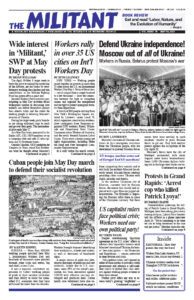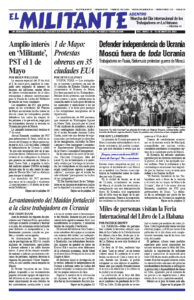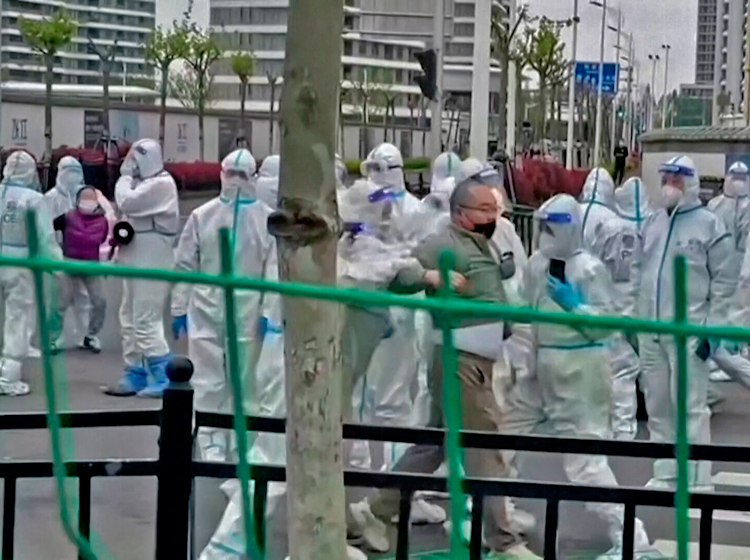Weeks of rising anger toward government officials in response to severe COVID restrictions and accompanying food shortages spurred protests in Shanghai at the end of April.
Dozens of residents in Jinze, a Shanghai suburb, marched through the streets demanding food. Residents in one area found a government storage site full of rotting vegetables that were not delivered to hungry families and smashed them in the street. Another group accused officials of stealing after storming a local government office and finding piles of rice and cooking oil.
A synchronized banging of pots and pans from many apartment buildings protested these conditions April 28, despite police threats against organizers and official claims the action was instigated by “hostile foreign forces.”
Most families in the city center can only send one person out of the house twice a week, in search of medicine, food and other necessities. Testing is compulsory and anyone infected is forced into unsanitary, crowded quarantine facilities.
The truth about these conditions — including shortages of daily necessities and medical access for many of the city’s 26 million residents — has spread across China despite enormous efforts by the government to silence it.
One six-minute video, “Voices of April,” captures the sounds of residents demanding food, the cries of COVID-positive children in quarantine separated from their parents, and the pleas of a son repeatedly rejected by hospitals as he sought treatment for his critically ill father. The video was censored, but just as quickly people found new ways to get it back online, and it was widely viewed.
One method involved a video of SpongeBob SquarePants watching TV, which was showing “Voices of April.”
Throughout the pandemic the Chinese government has used harsh lockdowns, compulsory testing and quarantining and border closures. None of these measures prevented the recent spread of the Omicron variant.
Cases began rising in March in the northeastern province of Jilin. The area has now been locked down for more than 50 days and residents subjected to 40 rounds of citywide COVID testing.
Full or partial lockdowns are now in place in more than two dozen cities, affecting up to 180 million people. Shanghai has been at the center of the latest outbreak, reporting more than half a million cases since March 1. This led to China’s unemployment hitting a 21-month high in March with many businesses, including Volkswagen, Tesla and iPhone assembly plants, forced to suspend operations in many locations.
Student poems of protest
Throughout the lockdown people have fought to get heard. A student poetry competition at Shanghai’s Jiaotong University became an outlet for public anger. Poems on the lockdown, freedom of speech and the war in Ukraine struck a chord. The university quickly pulled the poems down, but many popped up elsewhere on the internet.
Despite the protests, the government has not backed down on its repression. On April 23, Chinese social media was flooded with photos of workers installing five-foot-high fences outside some Shanghai apartment buildings, blocking residents in. In another area of the city cops clashed with residents who were being pushed out of homes that authorities plan to convert into additional isolation sites for those who test positive.
Thousands of beds are set up in a Shanghai convention center. One woman held at the facility told the New York Times that she stopped drinking water for several days to avoid using the overflowing portable toilet stalls. At a nearby gymnasium people sleep on cots an arm’s length from each other, with garbage piling up next to occupied beds.
Chinese President Xi Jinping claims his government has controlled the spread of the virus better than its rivals, including Washington.
Twenty percent of those above 80 years old, an estimated 130 million people, haven’t had their third vaccine shot. China’s homegrown Sinovac jab is less effective than vaccines available in the U.S. without a third dose.
In Beijing officials have launched compulsory testing of nearly 20 million residents, shut schools and locked down some residential buildings as COVID cases spread there, sparking fears of a wider lockdown similar to Shanghai’s. Despite the government’s assurances that food is plentiful, residents rushed to supermarkets and shelves rapidly emptied.
Weijian Shan, a wealthy businessman in Hong Kong and mainland China and supporter of Xi’s government, told a meeting of brokers — in what he thought were private remarks — “popular discontent in China is at the highest point in the past 30 years.”


